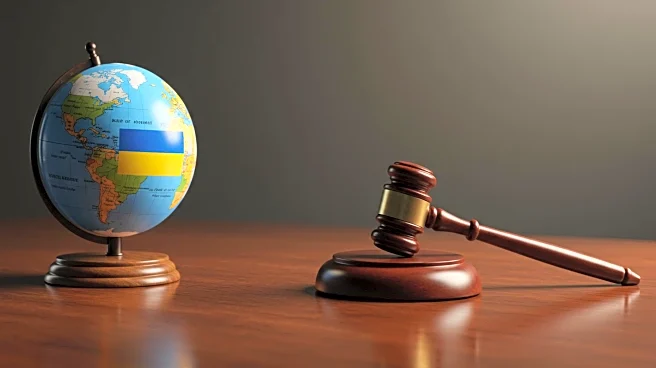What's Happening?
President Trump has shifted his position on the Ukraine conflict multiple times as he prepares for the upcoming Alaska summit. Initially, upon returning to the White House in January, he promised to end the war in Ukraine within a day. However, his approach has evolved, with criticisms directed at both Ukrainian and Russian leaders at various points. This change in stance reflects ongoing efforts to broker a ceasefire and bring an end to the conflict. BBC Verify's Nick Beake has analyzed the president's statements and actions in his quest for peace.
Why It's Important?
The evolving stance of President Trump on the Ukraine conflict is significant as it impacts international relations and the geopolitical landscape. The U.S. plays a crucial role in global diplomacy, and any shift in its position can influence the strategies of other nations involved in the conflict. The president's approach may affect U.S. foreign policy and its alliances, potentially altering the dynamics of peace negotiations. Stakeholders such as European countries, NATO, and international organizations are closely monitoring these developments, as they could lead to changes in military and humanitarian support for Ukraine.
What's Next?
The upcoming Alaska summit is expected to be a pivotal moment in the ongoing efforts to resolve the Ukraine conflict. President Trump's changing stance may lead to new diplomatic strategies or proposals during the summit. Key stakeholders, including Ukrainian and Russian leaders, as well as international diplomats, are likely to respond to these developments. The outcome of the summit could influence future negotiations and the potential for a ceasefire agreement. Observers anticipate possible shifts in U.S. foreign policy and international alliances based on the summit's results.
Beyond the Headlines
President Trump's fluctuating position on the Ukraine conflict raises questions about the consistency and reliability of U.S. foreign policy. This situation highlights the complexities of international diplomacy and the challenges of balancing domestic political pressures with global responsibilities. The ethical implications of supporting or criticizing foreign leaders in conflict zones are also a point of discussion. Long-term shifts in U.S. diplomatic strategies may emerge from this situation, affecting its role as a global peace broker.









